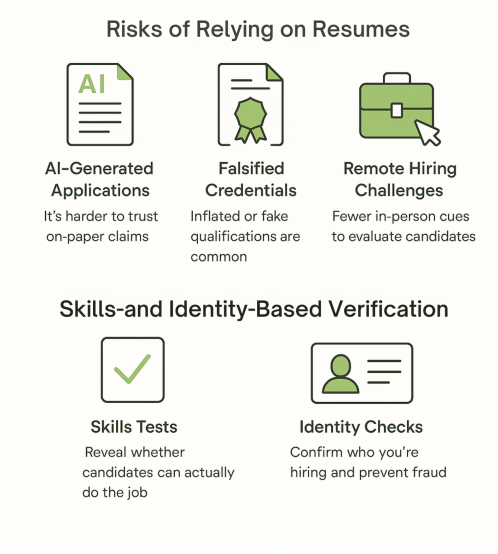The Rise of Skills Assessments and Applicant Data Verification in Hiring
If AI can write a resume in seconds, how do you know you’re hiring an honest, qualified person?
That’s the question hiring managers across industries are asking in 2025.
With the widespread use of generative AI tools like ChatGPT and automated resume builders, employers are flooded with polished applications that often don’t reflect the applicant’s actual capabilities or identity. It’s never been easier to look qualified on paper. But are candidates actually qualified? Are they even who they say they are?
To answer that, companies are leaning into a more innovative hiring approach: combining skills-based assessments with targeted tools to confirm applicant identity. And it’s changing the way we hire for the better.
The Resume Isn’t Dead, But It’s No Longer Enough
In today’s fast-paced hiring environment, resumes still serve a purpose. But on their own, they’re increasingly unreliable. AI tools can now auto-generate resumes tailored to job descriptions regardless of experience. Meanwhile, falsified employment histories and inflated credentials are on the rise, and with the shift to remote hiring, employers lose valuable in-person cues.
A 2025 Business Insider report found that over 60% of hiring managers believe AI-generated applications have made it harder to assess candidates accurately. That uncertainty creates real risks, including bad hires and potential regulatory exposure.

Enter Skills-Based Hiring: Show Me, Don’t Tell Me
Rather than relying solely on resumes, many organizations are now implementing skills assessments earlier in the hiring process. These tests come in various forms, including job simulations such as coding tasks or sales role-plays, timed technical assessments, cognitive challenges, or writing evaluations. They help employers evaluate whether a candidate can actually perform the duties outlined in the job description.
Skills-based hiring doesn’t just weed out unqualified applicants. It offers additional benefits: by focusing on demonstrated ability, it helps reduce bias in hiring, improves employee retention by aligning candidate skills with role expectations, and streamlines decision-making with objective data. Leading companies such as Google, Amazon, and Deloitte have all embraced skills-based assessments as part of a more equitable and effective hiring strategy.
Verifying Applicant Information: Your First Line of Defense
While skills assessments validate what a person can do, it’s also essential to verify the personal information candidates provide. With the increase in resume fraud and identity misuse, a thorough review of applicant-supplied data helps ensure accuracy, prevent fraud, and maintain compliance.
Private Eyes offers tools such as:
- SSN Trace History to identify alias names and address history
- Social Security Number Verification (SSNVS) to confirm if the SSN matches the name provided
- Form SSA-89 to authorize and validate SSNs through the Social Security Administration
These tools allow employers to verify that candidate information is consistent, legitimate, and not tied to suspicious or conflicting records, without requiring physical ID checks.
This process helps organizations detect errors, verify identity-related data, and remain compliant with federal and state regulations. It’s a critical step in a streamlined and secure hiring process.
Why Combining Skills and Data Verification Is So Powerful
Individually, both skills assessments and applicant data checks provide valuable insight. But when combined, they create a much more robust hiring process. Skills assessments filter out those who can’t do the job. Identity-related verification ensures that the candidate data aligns with legitimate records. Together, these tools help build trust in every hire.
This dual-verification model is especially important for organizations with remote or hybrid teams, companies in highly regulated sectors like finance and healthcare, and businesses that rely on high-volume hiring where resume screening alone can’t keep pace. The good news is that many platforms now offer seamless integration, allowing HR teams to incorporate both assessments and personal data verification without slowing down time-to-hire.
Best Practices for Employers in 2025
To stay competitive and compliant in today’s hiring landscape, employers should take a proactive approach. Start by verifying candidate-supplied information early in the application or interview process, not just at onboarding. Use tools and platforms that comply with regulations like the FCRA, EEOC, and ADA to avoid legal exposure. Partner with vendors that offer secure, U.S.-based services, and maintain open communication with candidates to ensure transparency.
Lastly, make a habit of regularly reviewing and auditing your hiring process. Laws change, technologies evolve, and staying updated ensures your hiring practices remain effective and compliant.
Lastly, make a habit of regularly reviewing and auditing your hiring process. Laws change, technologies evolve, and staying updated ensures your hiring practices remain effective and compliant.
Private Eyes helps employers verify candidate identity, confirm qualifications, and stay compliant at every stage of the hiring process.
Contact us today to learn how our background screening and identity verification solutions can help you achieve your hiring goals.
Key Takeaways
- Resumes can be misleading. AI and resume inflation make it harder to trust on-paper claims.
- Skills tests reveal actual ability. Pre-hire assessments show if candidates can actually do the job.
- Verifying applicant data confirms legitimacy. Tools like SSN trace and SSNVS help prevent fraud.
- Use both for smarter hiring. Combining skills and applicant verification reduces risk and boosts confidence.
Have questions? Speak to a Private Eyes expert for more information or to make an appointment to discuss adding Skills Assessments to your background process.
